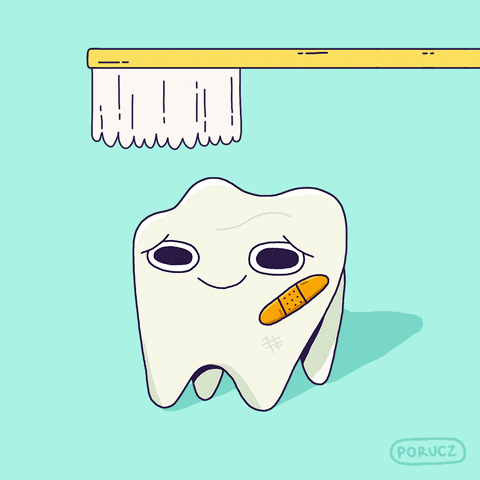
Published on Jan 22, 2024
Last modified on Mar 20, 2024
Wait, Does Menopause Also Affect My Teeth?!
4 min read

As progesterone and estrogen levels shift during menopause, our ENTIRE body is affected — from our brains to our skin to our hearts to our breasts to, yes, our teeth and gums too.
This time in life is associated with a slew of less-well-known oral health symptoms of menopause, including:
- Burning Mouth Syndrome (BMS)
- Xerostomia (aka dry mouth)
- Altered taste sensations
- Inflamed, bleeding gums
- Periodontitis
And get this: 43% of perimenopausal/menopausal women experience oral discomfort compared to just 6% of premenopausal women. Needless to say, it’s definitely NOT just you. Below, we’re breaking down the science behind why menopause affects our pearly whites and what we can do about it.
Hormones + oral health changes…what’s the connection?
Let’s talk estrogen/oestrogen first. This hormone binds to receptors in our oral tissues/salivary glands and helps to decrease bone resorption (which basically just means “breakdown”). Once we’re in the thick of perimenopause, estrogen levels begin to decline. The result? Thinning and weakened oral tissue, along with gum inflammation.
Estrogen isn’t the only culprit though. Progesterone also plays a role by helping support bone metabolism and bone formation. But like estrogen, progesterone levels dip during menopause, which leads to dryness.
While oral health issues become more prominent (read: annoying) during menopause, this isn’t the only time hormonal changes can mess with our oral cavity. If you’ve ever experienced swollen gums/salivary glands, pesky canker sores, or bleeding gums a few days before your period, you know what what we’re talking about here. In the case of menstruation, it’s actually due to spikes in progesterone (rather than menopause-related dips).
What oral health problems could pop up during menopause?
Xerostomia (aka dry mouth)
Decreased saliva production leads to dry mouth, which in turn can lead to periodontal disease since there’s not enough saliva to moisten and cleanse the mouth, neutralizing acids produced by plaque.
Burning Mouth Syndrome (BMS)
When it feels like you’ve just burnt your mouth on a too-hot spoonful of soup or sip of tea — except you haven’t (think tender, tingling, hot, scalding, numb, burning sensations).
Gingivostomatitis [jin-je-vo-sto-ma-ti-tis]
This is a MOUTHFUL of a name, we know. (No pun intended.) Compared to the gingivitis, which just refers to inflammation of the gums, gingivostomatitis is a fancy way to talk about inflammation of both the mouth AND gums. A double whammy that causes our gums to:
- Readily bleed
- Appear abnormally pale and dry or shiny and red
This inflammation may also put us at increased risk of canker sores, bad breath, fever, and swollen lymph nodes as side effects.
Periodontitis
Declining estrogen affects overall bone health, putting us at a greater risk not only for osteoporosis, but periodontitis as well. Also known as gum disease, periodontitis can cause:
- Inflammation of the tissues surrounding the teeth
- Bone loss in the jaw
- Decay/tooth loss
READ MORE: Is There A Test For Bone Density? Should We Be Getting It?
What can I do about it?
If you have dry mouth…
- Hydrate, hydrate, hydrate by taking sips of water throughout the day
- Chew gum! Citrus, cinnamon, and peppermint tend to be the most effective
- Suck on ice chips, sugar-free candies, or lozenges
- Try Xylimelts. These little tablets fit between the gum and lip and slowly dissolve, helping to stimulate salvia production. They’re available at drugstores or online and can even be used overnight.
If your gums are irritated…
Avoid sticky, overly spicy, salty, sour, or sugary foods which’ll cause further irritation
If you’re just looking to improve your overall oral hygiene
- You know the drill, but we gotta say it: brush twice a day using a soft toothbrush and fluoride toothpaste
- Floss!!! Future you will thank you, promise.
- Visit your hygienist and dentist twice a year for checkups
Dental hygiene FAQ
How do I know when a canker sore warrants a call to my dentist or doctor?
As a rule of thumb, any sores lasting longer than 3 days should be checked out by a healthcare professional.
If hormones are affecting gum health, can hormone replacement therapy (HRT) help?
Unfortunately, data on HRT for dental health is limited. And the research we do have shows mixed results. That said, there ARE some studies showing improvements in periodontal disease in particular for women on HRT. The takeaway? Further studies with longer follow-up times are needed to make definitive claims one way or the other about HRT and oral health.
READ MORE: Elektra’s Full Guide To Hormone Therapy
We’re always told to see our dentist twice a year. But could it be necessary to up the frequency during menopause?
If you have or are at a higher risk of gingivitis or periodontitis, it may be necessary to see a dentist more frequently than once every six months. This is definitely something to talk about with your dentist!
READ MORE: Elektra’s Full Guide To Gum Problems During Menopause
Okay, I’ve got my oral health covered. But I’m still struggling with other menopause symptoms!
We’ve got you covered.


